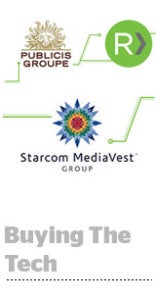 The programmatic ad tech consolidation continues. Publicis Groupe has bought mobile-focused ad platform RUN, previously known as RUN DSP, the holding company said Tuesday. Read more on RUN’s blog or read Publicis’ release. Details of the deal – including price – were not disclosed.
The programmatic ad tech consolidation continues. Publicis Groupe has bought mobile-focused ad platform RUN, previously known as RUN DSP, the holding company said Tuesday. Read more on RUN’s blog or read Publicis’ release. Details of the deal – including price – were not disclosed.
It’s a significant move for the holding company, whose recent financials have been less than stellar. Publicis Groupe’s revenue grew a scant 4% year over year, reaching $2.21 billion in the third quarter of 2014.
CEO Maurice Lévy blamed the meager growth on key account losses – many from its digital agency Razorfish – and what he referred to as the lingering “distraction” of the spectacularly anticlimactic failed merger with Omnicom.
Starcom MediaVest Group (SMG) will leverage RUN’s DMP and DSP in support of existing solutions, teams and agencies across Publicis Groupe, including ZenithOptimedia and Publicis trading desk VivaKi.
The RUN acquisition could mean that Publicis has finally decided to follow in the footsteps of WPP, the only other big-boy agency holding company that has pursued an ad tech “ownership” strategy via its Xaxis unit. WPP has previously invested in AppNexus and Rentrak. Omnicom, in the meantime, has Annalect – though the holding company’s CEO John Wren indicated during his last earnings call it trailed Xaxis.
As part of VivaKi’s Audience on Demand platform (AOD), RUN will also be integral to Starcom MediaVest, Publicis Groupe’s media planning and buying hub. VivaKi will reportedly leverage RUN’s data-management platform and its demand-side platform (DSP) technology to enhance AOD. According to a VivaKi source, one of the desk’s first initiatives will be configuring RUN’s tech to power AOD for cross-channel advertising.
The question then becomes: Will there be an internal mandate for Publicis clients to tap into RUN? If a client has a pre-existing DSP relationship, that could cause some friction.
But Lisa Weinstein, SMG’s president of global digital, data and analytics, told AdExchanger it won’t be an issue. “I wouldn’t say we won’t support or prefer RUN, in a sense – we bought them and we believe they’re ahead of the market – but we will be completely transparent with our clients,” Donohue said. “There will be no expectation that you have to use RUN. That said, we believe RUN will win and will prove out that its technology is accessible and scalable and that it solves for people-based targeting.”
Before RUN became a part of Publicis Groupe’s world, it entered into a direct relationship with Verizon to help the telco tackle the issue of deterministic targeting through its Precision Market Insights division. (Verizon Ventures, the investing arm of Verizon Communications, shelled out $1.5 million to RUN back in August 2013. That appears to be RUN’s only funding prior to the Publicis buy.)
The Verizon connection could prove to be an interesting strategic alliance for VivaKi and Starcom on the cross-device front. RUN’s tech includes cross-device targeting capabilities, and according to the company site, RUN recently increased its “capacity for cross-device execution” to more than 750 million unique devices per month.
RUN’s mobile focus might be part of what attracted Publicis Groupe’s eye. “A lot of people out there talk about how they can’t measure mobile,” Kim Glaser, RUN’s director of product, told AdExchanger in a previous interview. “And that’s holding back a lot of spend and investment, even though we know that consumption on mobile is only increasing.”
Digital could be Publicis’ saving grace, especially considering its disappointing Q3 results. According to Lévy, digital accounts for 42% of the company’s revenue and is growing by more than 9%.
Regarding tech ownership, rumors flew at the end of August about a possible Publicis acquisition of French retargeting company Criteo. At the time, AdExchanger surmised that Publicis was looking to develop a programmatic ad platform to rival WPP’s Xaxis. The Criteo deal never materialized. The RUN deal seems to imply that Publicis is now ready to jump into ad tech.
Correction 10/29: A previous version of this article incorrectly stated that RUN will be baked directly into VivaKi. Rather, VivaKi will leverage RUN’s DMP and DSP tech across Publicis Groupe.











